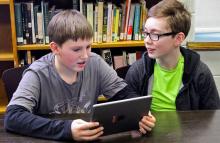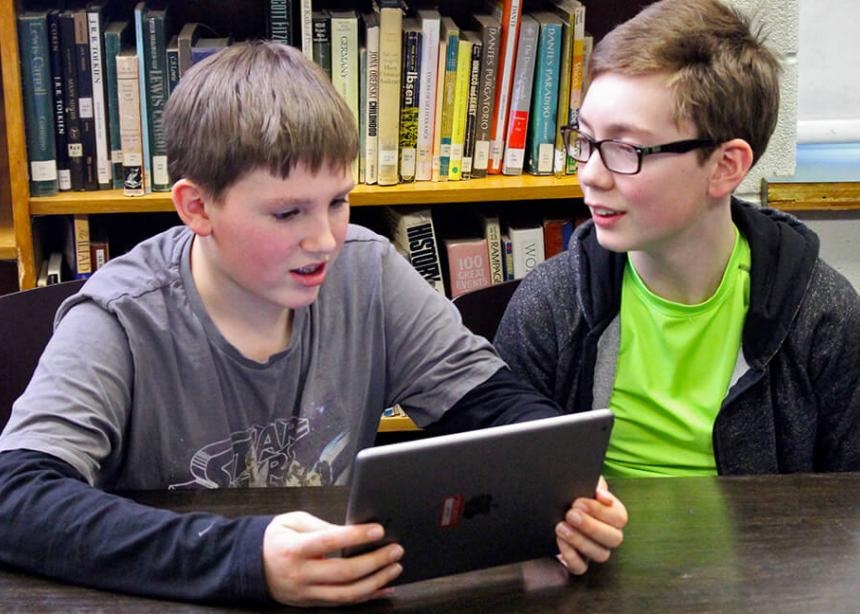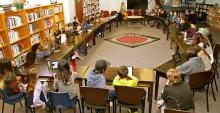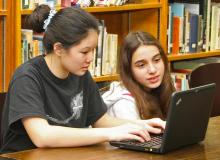For Ruth Charette, spending time online is a good way to both get her homework done and have fun playing games and watching funny videos. Using social media apps like Instagram and Snapchat, meanwhile, allows her to connect with her friends through pictures and videos, so they can keep each other updated on what they’re doing.
For all the benefits that the Internet and social media provide, Charette knows it is important to be safe. Her parents have taught her to be careful online, and to never give out personal information.
“The company . . . might be giving your information out to other people,” says Charette, a Grade 8 student at Rockway Mennonite Collegiate in Kitchener, Ont. “You don’t know who can take that [information] and do things you didn’t give them permission to do with it.”
The importance of online safety was reiterated for Charette and her Grade 7 and Grade 8 peers at Rockway during a half-day session the school organized to explore the topic of “digital citizenship.” Held on Jan. 29, when the rest of the school’s students were writing exams, the event was meant to raise awareness about how students interact with each other through social media and to teach effective ways to communicate online.
Rockway’s mission includes “forming faith . . . building character” in its students. The event on digital citizenship was an extension of the school’s desire to teach students what it means to make positive contributions to their community.
Helmi Wiebe, Rockway’s librarian, led the event and wanted students to explore the question: “What does it mean to be a good citizen when you’re not just physically in the world, but connected to the world digitally?”
The session began with students watching a short video called Bully Dance from the National Film Board of Canada that explores bullying. After watching, students logged onto an interactive website and worked in pairs to answer questions about bullying that popped up on the screen. The questions looked at the meaning of words like “bully,” “bystander” and “victim.”
Next, students read a story about a boy named Kevin who is bullied online after a video he made that was only supposed to be seen by a friend is shared publicly and viewed millions of times.
In an effort to teach students that they have opportunities to change the outcome of these kinds of experiences, Wiebe asked the students to work in groups and write an alternate ending to the story by making a storyboard on their iPads or creating short skits.
For Micah Neufeld, a Grade 7 student, this activity was a highlight of the event. Neufeld’s group created a skit in which Kevin empowers himself by posting a follow-up video online that garners positive reviews. “It was a new twist on how to learn about this kind of thing,” Neufeld says. “People had fun, but they were still learning.”
Using social media has benefits for young people in junior high, Neufeld adds. Watching YouTube clips helped him learn how to tape his hockey stick, and visiting his friend’s page has helped him keep up with his friend, who is living in Europe for a year.
The digital citizenship event was a reminder to be careful, and that once something is shared online, there’s no telling where it will end up. “There is no unposting,” Neufeld says.
He adds that, while many of his classmates had learned about the topics presented during the event before, it is still important to review the information. “It reinforced the way I communicate and it just brought back to my attention that, yes, you have to be careful,” Neufeld says.
Charette says that learning about the difference between being a “passive bystander” and a “brave upstander” during the event impacted her ability to recognize online bullying. “It changed the way that, if I see it happening, I know then I can react on it faster than I normally would have,” she says.
Wiebe was happy to see students engaging with the material. “Our students are actually very savvy when it comes to digital connection,” she says. At the same time, it was good to review the topics presented. “Even though these kinds of issues are pertinent and right on the surface for adults, [they’re] kind of underlying for students and need to be brought to their attention.”

Micah Neufeld, left, pictured with Aidan Morton Ninomiya, says Rockway’s digital citizenship event reinforced the importance of communicating with care online. (Photo by Charles Kruger)






Add new comment
Canadian Mennonite invites comments and encourages constructive discussion about our content. Actual full names (first and last) are required. Comments are moderated and may be edited. They will not appear online until approved and will be posted during business hours. Some comments may be reproduced in print.